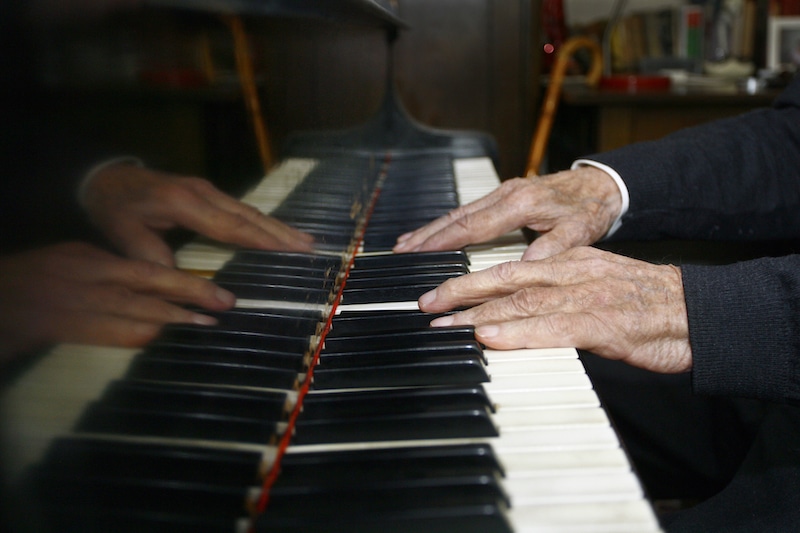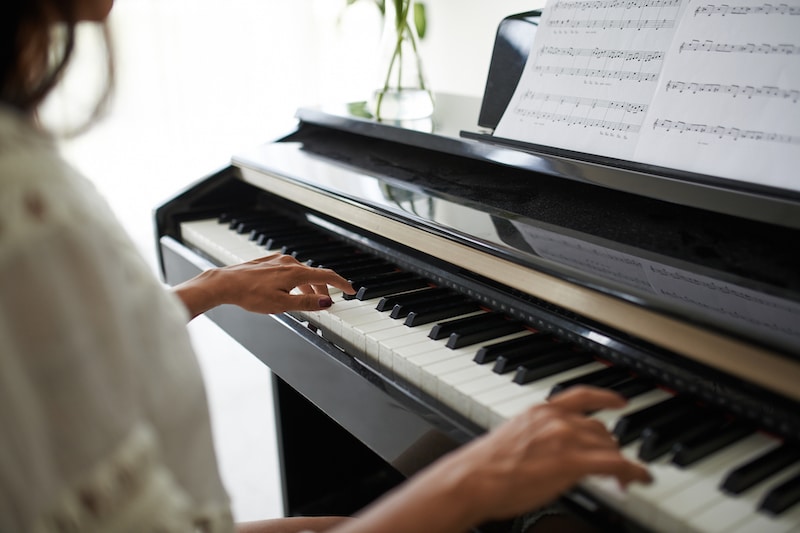Piano playing has been a staple of musical culture for centuries, and with good reason. Not only does learning to tickle the ivories provide a great source of personal enjoyment, but it also comes with a wealth of benefits that can enhance your life in countless ways.
Whether you’re a music lover or just looking to add a new hobby to your repertoire, you might be surprised to learn that playing the piano can do wonders for your mind, body, and soul. So let’s dive into ten amazing benefits of learning piano and find out why it’s never too late (or too early) to start.
1. It Is Good For Your Memory

One of the first reasons why you should consider learning how to play the piano is the positive impact it has on your memory. Learning to play an instrument requires a great deal of memorization, from mastering sheet music to remembering the placement of your fingers on the keys. This constant repetition and recall helps to improve both short-term and long-term memory.
In addition, playing piano engages multiple areas of the brain at once, including memory centers, which helps to strengthen the connections between different parts of the brain. This can lead to improved cognitive function overall and can even delay age-related decline in memory and other cognitive skills.
So if you’re looking for a fun and engaging way to boost your memory and keep your mind sharp, look no further than the piano. And who knows? You may just surprise yourself with how much you can remember!
2. It Helps Alleviate Stress And Reduce Anxiety

In today’s fast-paced and demanding world, stress and anxiety levels are higher than ever before. Luckily, playing the piano can provide a much-needed escape from the stressors of daily life and offer a soothing release for both the body and mind.
Sitting down to play the piano allows you to let go of all other distractions and focus solely on the music, leading to a state of mindfulness and relaxation. This not only helps to alleviate stress but can also reduce symptoms of anxiety, allowing you to feel more calm and centered.
3. It Removes Negative Emotions
Learning to play the piano—in fact, playing music overall—can help one feel more happier. Musical sounds, particularly the soft tinkling of piano keys, can remove negative feelings and replaces it with happy ones.
In addition, playing the piano can activate the release of our happy hormones like dopamine and endorphins, the body’s natural feel-good chemicals, further contributing to a sense of well-being.
So if you’re feeling overwhelmed and in need of a mental break, grab a seat at the piano and let the music do the rest!
4. It Boosts Creativity And Imagination
Playing the piano has been shown to have a profound impact on a person’s creativity and imagination. Learning to play an instrument requires not just technical skill, but also a willingness to be imaginative and think outside the box.
Whether you’re composing your own music, improvising, or interpreting existing pieces, playing the piano requires a high degree of creativity and imaginative thinking.
Even if you are simply playing the notes on the page, there are plenty of different ways to strike the notes. Two people can play the same piece and generate a completely different sound from each other. Better yet, both styles can be equally as beautiful.
You may not think you are a very creative person, but when you sit down at the piano, you might be surprised at just how creative you are.
5. It Helps You Learn The Art Of Practice And Perseverance
Learning to play the piano is a challenging and rewarding experience, but it also requires a great deal of practice and perseverance. This is particularly true in the early stages of learning, when progress can be slow, and it can be tempting to give up.
However, the process of mastering the piano teaches valuable lessons about the importance of consistent practice, setting goals, and working hard to achieve them. These skills are transferable to other areas of life and can help to build character and resilience.
Playing the piano also teaches patience, as progress often comes gradually and through small increments. With each new piece learned and each new skill mastered, you’ll gain a sense of accomplishment and develop the confidence to tackle even more challenging goals.
6. It Improves Hand-Eye Coordination

Playing the piano is a great way to improve fine motor skills. Piano playing requires precise finger movements, hand-eye coordination, and dexterity, which can all lead to improved control and agility in the fingers.
As you practice and perform, your fingers will become stronger and more nimble, leading to improved dexterity and control not just in piano playing but in other tasks that require fine motor skills as well.
Additionally, the repetitive and controlled movements involved in piano playing have been shown to have therapeutic benefits for individuals with conditions such as arthritis, Parkinson’s, and other movement disorders.
7. It Enhances Problem-Solving Skills
Playing the piano is a great way to enhance problem-solving skills. Learning to play an instrument requires the ability to analyze, interpret, and solve musical problems, from technical issues with hand positions to complex musical passages that require creative solutions.
This type of problem-solving requires the brain to work in new and creative ways, which can help to enhance cognitive function and improve overall problem-solving skills.
Additionally, playing the piano also requires the ability to analyze and interpret sheet music, which can help to develop analytical and critical thinking skills. Whether you’re working through a difficult piece or trying to perfect your performance, the piano provides ample opportunities to enhance your problem-solving skills.
8. It Increases Self-Confidence
Learning to play the piano can be a challenging experience, but with dedication and effort, it can also be extremely rewarding. As you progress in your studies, you will feel a growing sense of pride and accomplishment in your abilities. This boost in self-confidence can translate into other areas of your life and lead to increased self-esteem and self-assurance.
The act of performing in front of others, whether in a recital or informal setting, can also help to build confidence. This requires you to overcome any nervousness or stage fright and showcase your talents.
Performing in front of an audience can be a nerve-wracking experience, but the sense of achievement that comes with a successful performance is worth the effort.
9. It Improves Academic Performance
Playing the piano can help improve your child’s academic performance. Studies have shown that students who participate in music education often score higher on standardized tests and perform better in school overall.
This is because learning to play an instrument requires discipline, focus, and regular practice, all of which are skills that can be transferred to other areas of life.
Additionally, playing the piano can also help to develop critical cognitive skills such as memory, attention, and problem-solving, which can be beneficial in a variety of academic subjects.
So if you’re looking for your child (or even yourself) to get ahead in school and achieve academic success, consider getting them started on the piano! It just might give them the edge they need to ace their studies.
10. It Helps You Appreciate Different Types Of Music
If you want to learn about different types of music, one of the best ways to do so is to play the piano. If you listen to the radio, you probably hear the same songs over and over. Instead of keeping yourself in an echo chamber, why not learn about different types of music?
As you delve into different styles and genres of music, you’ll gain a deeper understanding and appreciation for the various forms of musical expression from around the world.
From classical pieces to jazz standards to traditional folk songs from different cultures, you’ll learn to appreciate the unique qualities and nuances of each type of music and the cultures they came from.
Summing Up Our List Of The Benefits Of Learning The Piano
As you can see from the list above, learning to play the piano comes with a wealth of amazing benefits. Whether you’re looking to improve your memory, alleviate stress, broaden your musical horizons, or build your confidence, playing the piano is a great way to do so.
And if you’re ready to get started, check out our list of the best online piano courses. With so many options available, you’re sure to find the perfect course to help you get started on your musical journey!
